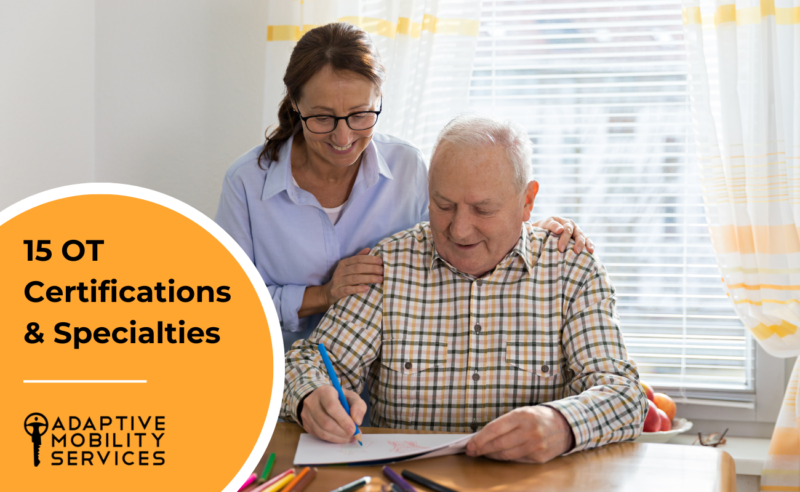
15 OT Certifications and Specialties
The dynamic and multifaceted field of occupational therapy is essential in assisting people navigating challenges and enhancing their quality of life. With a wide variety of specialties and certifications available, occupational therapists (OTs) can customize their expertise to meet the unique needs of their clients. Here, we will go over some of the most popular OT certifications and specialties for those looking to expand their knowledge or narrow down their area of expertise.
1. Driver Rehabilitation Specialist
OT Driver Rehabilitation Specialists evaluate and train individuals with disabilities or injuries to regain their independence behind the wheel. This area of OT expertise includes assessing the client’s cognitive, physical & motor, and visual capabilities, as well as recommending adaptive equipment and providing on-the-road instruction to ensure safe driving practices.
Are you an OT interested in becoming a Driver Rehabilitation Specialist? Check out our online education specially designed by OTs, for OTs! Complete Part 1: Driving Risk Assessment to learn how to complete reimbursable Driving Risk Assessments in the clinic! Part 2: OT Driver Rehabilitation Training teaches you the skills necessary for conducting behind-the-wheel evaluations with clients. This training prepares you to be the OT DRS in the car. Ready to take the next step in your OT Journey? Enroll in our program today!
2. Low Vision Therapist
Certified Low Vision Therapists (CLVTs) assess people with visual impairments using functional vision diagnostic tools. They evaluate things like depth perception, contrast sensitivity, visual acuity, visual fields, and color vision. CLVTs create individualized intervention plans based on these evaluations, which can involve environmental modifications, assistive technology, and adaptive techniques. In spite of visual challenges, the aim is to empower clients to attain greater independence when completing daily tasks, improving their overall quality of life.
Fun Fact: Some OTs combine their skills as a CLVT with driving rehab to work with low vision driving, and in some states, bioptic driving.
3. Hand Therapist
Hand therapists specialize in the rehabilitation of the upper extremities, including the hand, wrist, elbow, and shoulder. The OT certified hand therapist, CHT, These OTs uses specialized techniques and exercises to help clients heal from surgeries, injuries, or chronic conditions, by restoring function and relieving pain. With an OT degree you can practice hand therapy on a basic level, but a certification in hand therapy is recommended if you are looking to narrow down your specialty as an occupational therapist.
4. Brain Injury Specialist
The primary focus of brain injury specialists is to aid patients in their recovery from acquired or traumatic brain injuries (TBIs). Certified Brain Injury Specialists (CBISs) examine the cognitive, emotional, and physical challenges that may result from a brain injury and use focused interventions to improve functional abilities and encourage independence. Specialists work closely with patients and their families to create individualized treatment programs that include strategies to improve memory, attention, and executive functioning.
5. Aquatic Exercise Therapist
Aquatic therapy involves using water-based exercises to promote rehabilitation and improve a client’s mobility. OTs with their Aquatic Therapeutic Exercise Certification (ATRIC) are knowledgeable, well-rounded aquatic therapy practitioners that utilize the unique properties of water to facilitate movement and minimize strain on joints. The unique combination of buoyancy and resistance allows clients to perform exercises they may not be able to perform on land, allowing them to enhance their strength and endurance.
6. Assistive Technology Professional
Assistive Technology Professionals (ATPs) specialize in evaluating and recommending equipment and tools that improve the abilities and independence of clients. They evaluate the conditions and needs of their clients in order to determine the appropriate assistive technology, which may range from communication tools to mobility aids. ATPs offer training on how to use assistive technologies to ensure that clients are able to successfully incorporate their new devices into their daily lives.
7. Ergonomic Assessment Specialist
Occupational therapists who conduct workplace ergonomic assessments are Certified Ergonomic Assessment Specialists (CEAS). They identify hazards in the workplace that may put employees at risk for ergonomic-related injuries, or musculoskeletal disorders, such as carpal tunnel syndrome, bursitis, and chronic neck or back pain. A CEAS can conduct ergonomic assessments for a variety of workplaces, from offices to industrial facilities
8. Perinatal Health Specialist
Perinatal Health Specialists (PHS) expand access to occupational and physical therapy in the hospital and home during pregnancy and immediately after birth. PHSs help to enhance a mother’s recovery around the time of childbirth by providing equitable access to care before and after birth & surgery. These specialists provide interventions to address pelvic girdle pain, incontinence, and pelvic floor dysfunction.
9. Autism Specialist
For OTs who frequently work with autistic individuals, a Certified Autism Specialist (CAS) certification is a great way to demonstrate your commitment to understanding autism spectrum disorders (ASD) and the best practices for working with these individuals. The interventions provided by a CAS are tailored to meet the unique needs of each patient they work with. A Certified Autism Specialist can work in school settings or clinical settings in a variety of positions.
10. Aging In Place Specialist
Certified Aging in Place Specialists (CAPSs) focus on enabling senior citizens to reside safely and independently in their homes. They evaluate living spaces and suggest modifications to improve safety and accessibility. The CAPS training program teaches OTs the management, customer service, and technical information needed by a business serving the needs of seniors.
11. Psychiatric Rehabilitation Practitioner
Certified Psychiatric Rehabilitation Practitioners (CPRPs) focus on supporting individuals with mental health issues to reach their personal goals and enhance their quality of life. CPRPs collaboratively work with clients to build skills for daily living, social interactions, and career aspirations to promote independence and community integration. OTs with this certification use evidence-based techniques to address issues like stress management, problem-solving abilities, and coping skills.
12. Diabetes Care and Education Specialist
Certified Diabetes Care and Education Specialists (CDCESs) specialize in pre-diabetes and diabetes prevention and management. This certification is very beneficial for OTs working in community health or primary care settings, or for those who are interested in integrating diabetes education into their OT practice.
13. Neuro-Developmental Treatment Certification (C/NDT)
The Neuro-Developmental Treatment Certification (C/NDT) is a hands-on approach that is based on the analysis of movement. This is most commonly used with adult patients who have suffered from brain injuries or strokes. Neuro-developmental treatment can also be helpful for children with neuromotor disorders, such as cerebral palsy.
14. Seating and Mobility Specialist
A Seating and Mobility Specialist is a specialized Assistive Technology Professional (ATP/SMS). These specialists assess clients’ mobility skills and provide recommendations for seating and/or mobility equipment.
15. Skills2Care Certification
Occupational therapists who are certified in Skills2Care provide hands-on education to family members of dementia patients to enhance their abilities to manage day-to-day challenges and take care of themselves. Strategies for care are tailored to the unique needs of each family the OT works with.
Contact Adaptive Mobility
Occupational Therapy has a variety of specialties that address a wide range of client needs. Whether it’s helping someone regain their driving independence as a Driver Rehab Specialist or supporting a loved one with dementia, OTs play a critical role in enhancing quality of life. At Adaptive Mobility, we specialize in training occupational therapists on how to become driver rehabilitation specialists. To learn more about our education programs, contact us today!
Meet Susie!

Susie Touchinsky, OTR/L, SCDCM, CDRS, is an established expert in both occupational therapy and driver rehabilitation. She has been an OT for more than 20 years and brings expertise and a love for helping others in her speeches and trainings.
Learn More With Our OT Driver Rehabilitation Specialist Courses
Try Our Free OT DRS Courses:
- OTs Role With Driving
- GRID: Generalist Resource to Integrate Driving
- Readiness to Drive: IADL Checklist
- FREE 6 Driving Resources for the OT
- 5-Steps Our Clients Use to Start Their Own Highly-Paid OT Driver Rehab Business
- Driving Risk Screening Tools
- BCAT Brief Cognitive Assessment Test System Overview
- BCAT Part 2: CBS 8 & 15-for-Me
Become the best OT Driver Rehabilitation Specialist you can be by being a life long learner.
